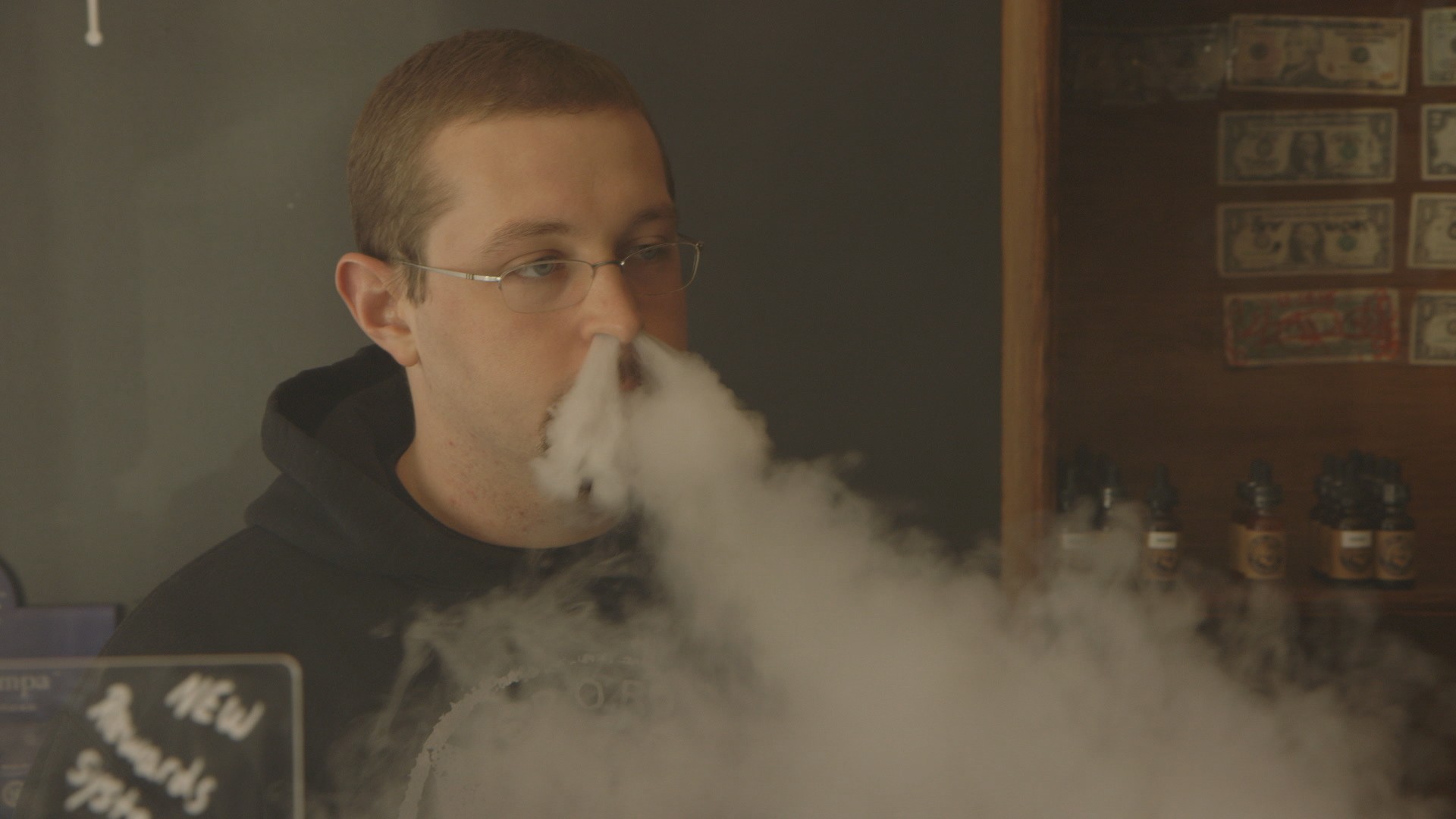Vaping started having a moment years ago and hasn't stopped. According to the CDC, in 2016 3.2 percent of US adults were current vape pen users; a recent New Yorker feature quoted a Wells Fargo analyst who said the US vaporizer market would be worth $5.5 billion this year, 25 percent more than 2017. Some use vaporizers as a safer, cleaner, and more discreet alternative to cigarettes, while others have embraced it as the best way to get high—depending on the pen, you insert weed, e-liquid, or dab, and then inhale the vapor. Popular California marijuana delivery app Eaze noted in its 2017 “State of Cannabis” data report that 72 percent of its millennial consumers had purchased one (they have 350,000 consumers total). Vape pens even have their own holiday—July 10, a.k.a. 710, a.k.a. "OIL" upside down.Given their popularity, it isn’t surprising that vape pens have been the target of aggressive counterfeiting. Weedmaps is a cannabis discovery platform that allows brands to verify stores and products, making it something of a first line of defense against fake cannabis products. “Of the 240,000 products that retailers submitted for verification by a brand on the Weedmaps platform, 6,000 (2.5%) were rejected by the brand, presumably due to being counterfeit,” Weedmaps president Chris Beals wrote to me.The logic behind counterfeiting pens is the same behind ripping off any high-status brand: Produce merch at lower cost, then fool people into buying the knockoff. “People aren’t really using strains anymore, they’re using brands and brand names,” Beals told me over the phone. “Really high-end brands are generating more consumer recognition, and those brands are correspondingly demanding higher prices.” And profit margins on vape pens are already high—Quartz reported in 2016 that vape pens have a 57 percent profit margin in the state of Washington.

The rise of e-commerce and overseas production has made counterfeit goods exceedingly easy to produce cheaply and sell. Chinese e-commerce giant Alibaba is particularly infamous for selling counterfeit vape pens to consumers and dispensaries. “The barrier of entry for someone is extremely low,” Chris Folkerts, founder of Grenco Science, a vape pen manufacturer, explained. “In 2013 it was rampant—unfortunately, a lot of people had no idea they were purchasing counterfeit products. People thought they owned a G Pen. And many of them never knew they actually didn’t.”The G Pen retails for $69.95—making it more expensive than an impulse buy, but more affordable than the company's “pro” and “elite” models, which are in the $100-150 range. On Alibaba, vaporizers labeled “G Pen” can be found for as cheap as $3, though most of them are clearly knockoffs with official names like “Snoop DogG,” which point to the celebrity partnership that earned the G Pen its reputation. A blog post from Slick Vapes about spotting a fake Pax 3 shows just how convincing counterfeits can look. The outside packaging of the two pens examined by the blog was identical, save for small typos or font spacing on the back and having one tamper-proof seal instead of two. The products itself are similarly close in appearance—the only mistake is the logo appearing on the wrong side of the charger cord. But when you use the unit, the defects are glaring. According to Slick Vapes, the fake took more than five hours to charge past one bar and fizzled out after three uses despite being new. It had no bluetooth and needed to be shaken to display battery life.The idea of a prestige vape pen is relatively new, as the vaping industry is still so young. Pax Labs was founded in 2007 and released the Juul in 2017. Grenco Science started in 2012, the year Colorado and Washington legalized recreational weed. Rokin in 2016, KandyPens in 2014—the list goes on. This notion of a vape pen as a status symbol, an object of adoration often seen in the hands of a celebrity, might partially explain the popularity of vape pens among teens. (According to the National Institutes of Health, one in three 12th graders have vaped in the past year.)KandyPens was featured in DJ Khaled’s music video “I’m the One,” the plot of which is that it is extremely awesome to be rich and famous. Chance the Rapper, Lil Wayne, Justin Bieber, and Quavo traipse about a decadent mansion decked with women in bikini tops and denim cutoffs, jiggling ebulliently. Bieber—with the 90s-esque platinum blonde hair that has taken over LA—walks on a platform tiled pool. A woman rides by on a white horse. Someone is grilling. They play croquet. There’s a hedge maze, and they are all doing that bounce-and-point-your-finger-sporadically move that seems to be in every music video rapper’s toolkit. KandyPens is just one more signifier of the life you want to have, or at least the life you want to watch on YouTube.The company's Instagram follows this pattern too. The account is a late 90s/early 2000s fever dream of trendy pastels and bottomless women (in both senses of the word). There’s Amber Rose, KandyPens' latest celebrity collaborator, vaping poolside. KandyPens offers vape pens for as little as $35, but the Amber Rose–endorsed version is $150. The potential profit of counterfeit versions is obvious.And if you need to use a vape pen for pain relief and the heating element stops working, that's a serious problem. "For a lot of folks, they don’t have another $100 to spend to buy stuff that works," said Beals. "And that’s what they rely on for pain relief.”Vape pen companies are well aware of these issues, but as is often the case with counterfeiting, there is little recourse. Companies who have trademarked products can file a lawsuit but getting a judgement requires a lot of legal work. Last year, Grenco Science was awarded $47 million in a counterfeit case after suing 65 different online retailers selling knockoffs, which suggests the scope of the problem. “We filed lawsuits every 60 to 90 days, 40 at a time,” Folkerts told me. Most of the defendants in such cases are located overseas and will never show up in court, much less pay damages.This puts the onus on brands to take preventative measures. Grenco Science now issues serial numbers and has a team dedicated to combating clones. Flav (previously FlavRx) has some of the industry's most aggressive and proactive stances on counterfeiting, utilizing evolving package design to deter copycats. “We’d switch up packaging, making it more difficult to rip off,” Braelyn Davis, Flav's marketing director, told me. “By the time counterfeiters got their hands on packaging to update it, we’d already updated ours again.” The company also has a social media team constantly screening and following up on photos of fake products. Weedmaps also combats the problem by requiring products to be verified on their platform.The best thing you can do to protect yourself is to check the official website for the vape pen you're buying and arm yourself with knowledge about their packaging and verification techniques. As tedious as it is, checking for counterfeits means paying close attention to serial numbers and packaging, and reporting it to the relevant company if your device isn't working or appears to be fake.Dispensaries and consumers are still saddled with the ultimate responsibility of making sure products are legitimate. Beals told me his team recently found counterfeits at an unknowing dispensary in Michigan. “These are very well-known marquee brands," Beals said. "Most likely, the dispensary didn’t even know that those were counterfeit products."Correction: An earlier version of this article incorrectly stated that KandyPens was founded in 2017.Sign up for our newsletter to get the best of VICE delivered to your inbox daily.Follow Nicole Clark on Twitter.
Advertisement

The rise of e-commerce and overseas production has made counterfeit goods exceedingly easy to produce cheaply and sell. Chinese e-commerce giant Alibaba is particularly infamous for selling counterfeit vape pens to consumers and dispensaries. “The barrier of entry for someone is extremely low,” Chris Folkerts, founder of Grenco Science, a vape pen manufacturer, explained. “In 2013 it was rampant—unfortunately, a lot of people had no idea they were purchasing counterfeit products. People thought they owned a G Pen. And many of them never knew they actually didn’t.”
Advertisement
Advertisement
Obviously, counterfeiting luxury products isn’t anything new—but your knockoff Louis Vuitton will never physically harm you beyond a bruised ego. A counterfeit vape pen could do serious damage. The heating element on the pen could fail to heat up adequately, producing dangerous chemicals rather than vapor. In a worst-case scenario, the cartridge could be defective and explode, or it could leak. “You hear complaints of all the oil coming out of the cartridge," Beals told me. "Or the heating element never works, or the product tastes terrible or seems to have a cloudy color, things like that.”
Advertisement
Advertisement

